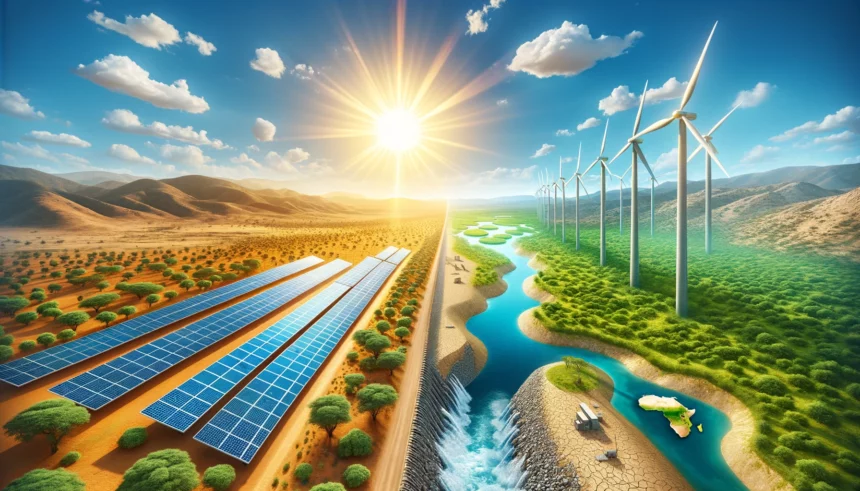Key Points to Remember
- Hydropower’s Hidden Costs: Emissions and environmental disruption make it less attractive.
- Renewables on the Rise: Solar and wind will be more cost-effective by 2030.
- Strategic Planning: Incorporating environmental impacts and regional cooperation is essential for sustainable development.
Africa is gearing up for an energy revolution. With over 300 new hydropower projects on the drawing board to meet rising electricity demands, it’s important to take a step back and evaluate the potential impacts. While hydropower has long been seen as a reliable and low-carbon source of energy, it comes with significant environmental costs. Moreover, climate change threatens the very water sources hydropower depends on. Let’s explore how solar and wind power can provide a better path forward for Africa.
The Drawbacks of Hydropower
Hydropower currently leads Africa’s renewable energy production, with about 40 GW of capacity generating 150 TWh of electricity annually. However, several issues make it a less ideal solution moving forward:
- Environmental Impact: Large dams can significantly disrupt river ecosystems. African river basins, home to global biodiversity hotspots, are particularly vulnerable. Dams can fragment rivers, affecting plant and animal life.
- Emissions: Contrary to popular belief, hydropower isn’t entirely green. When land is submerged to create reservoirs, the decomposing biomass releases carbon dioxide and methane, potent greenhouse gases.
- Climate Vulnerability: Hydropower’s effectiveness is threatened by climate change. Droughts can severely reduce water availability, making hydropower unreliable and less cost-effective.
The Promise of Solar and Wind Energy
Our research, covering energy demand and environmental impact in Africa from 2020 to 2050, shows a clear shift. By 2030, solar and wind projects are expected to be more cost-effective than new hydropower initiatives. Here’s why solar and wind energy are promising:
- Cost-Effective: Advances in technology are making solar and wind power cheaper to produce. By 2030, these renewables will outperform hydropower in terms of economic viability.
- Environmental Benefits: Unlike hydropower, solar and wind projects have a minimal impact on ecosystems. They don’t require massive infrastructure that disrupts river flow or leads to significant greenhouse gas emissions.
- Reliability: Solar and wind power are less susceptible to the effects of climate change. While weather patterns do affect them, the variability can be managed with current technology and infrastructure planning.
Our Research Findings
We are a team of environmental and energy systems researchers who analyzed the potential development of energy systems in Africa. Here are some key takeaways from our study:
- Economic Viability: Only 40% to 68% of the planned hydropower capacity will remain economically attractive compared to solar and wind.
- Investment Needs: An increase of 1.8% to 4% in annual investment in new power plants is required to build a resilient energy infrastructure against extreme droughts.
- Environmental Impact: If all planned hydropower projects proceed, river fragmentation in Africa could rise to 42%, leading to significant biodiversity loss.
Moving Forward
To ensure a sustainable energy future, African governments must:
- Diversify Energy Sources: Invest more in solar and wind projects to reduce reliance on hydropower.
- Consider Environmental Costs: Incorporate social and environmental factors into energy planning. This approach will ensure that new projects do not harm communities or ecosystems.
- Promote Regional Cooperation: Collaborate across borders to distribute investment costs and manage energy deficits effectively.
Why This Matters
Hydropower’s perceived low cost and low carbon footprint are outdated notions. It’s crucial to shift focus to more sustainable and cost-effective energy sources like solar and wind. These renewables offer a way to meet Africa’s growing energy demands without compromising its rich biodiversity and environmental health.
For Africa to thrive, we need to embrace a future powered by the sun and wind. This shift not only promises a greener planet but also a more resilient and equitable energy system for all.
















